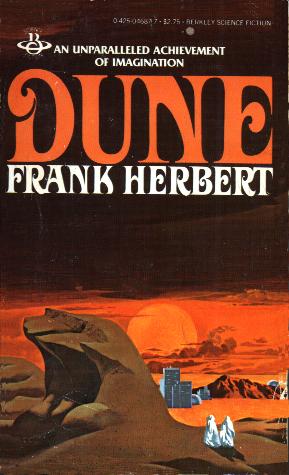 One of my favorite books, and series, in the science fiction genre is Frank Herbert's Dune, the original published in 1965, along with the sequels, and I've also enjoyed the recent posthumous additions to the canon co-authored by his son, Brian Herbert, and Kevin Anderson. Herbert had a wonderful sense of ecology, in the biological sense of understanding the interdependence of species and physical environments. The Dune series was very much about planetary ecosystems, the interactions within cycles of life, and evolutionary adaptation to environments.
One of my favorite books, and series, in the science fiction genre is Frank Herbert's Dune, the original published in 1965, along with the sequels, and I've also enjoyed the recent posthumous additions to the canon co-authored by his son, Brian Herbert, and Kevin Anderson. Herbert had a wonderful sense of ecology, in the biological sense of understanding the interdependence of species and physical environments. The Dune series was very much about planetary ecosystems, the interactions within cycles of life, and evolutionary adaptation to environments.
And he also had a handle on historical ecology, the long view of world history, which is rooted in the philosophy of Giambattista Vico and G.W.F. Hegel, among others. But notably it was the pioneering science fiction writer H.G. Wells who published The Outline of History in 1918, 23 years after the publication of his novel, The Time Machine. Oswald Spengler's Decline of the West, published in 2 volumes in 1919 and 1922 was also quite influential. The pioneering media ecology work of Lewis Mumford also deserves some mention, notably the seminal Technics and Human Civilization published in 1934, which divided history into different eras based on types of materials, energy, and tools and machines that were used.
But it was Arnold Toynbee, more than anyone, who demonstrated that it was possible to grasp the history of the world in its entirety, and make sense of its patterns. Toynbee's A Study of History was published in 10 volumes, the first 3 in 1934, the second 3 in 1939, and the final 4 in 1954. Toynbee's influence can be seen in Isaac Asimov's outstanding Foundation series, which began publication as a series of short stories in 1942 (and I'd include the Foundation books on my list of science fiction favorites as well, just a notch below Dune).
And Toynbee's influence is readily apparent in the Dune series, the first Dune novel being published in 1965, at a time when the ecology or environmentalist movement was just getting off the ground. Much like the media ecology of Harold Innis, Dune's historical ecology is grounded in a solid matrix of political economy. The only conceit of the book is that someday, in the far, far future, humanity spread out over many planets would fall back into a feudal-like social organization on a galactic scale, with an Emperor, Dukes, Barons, and other noble houses and aristocracies, as well as guilds. The sense of a return to the medieval is itself very much in keeping with McLuhan's observation in The Gutenberg Galaxy that "the new electronic interdependence recreates the world in the image of a global village." And there is certainly some similarity between the decentralized electronic network, as exemplified by the internet, and the decentralized political structure of feudal society.
Another aspect of Dune altogether is the generally held bias and outright prohibition in that future scenario against "thinking machines," aka computers and artificial intelligence, part of the back story of a much earlier epoch in history when a large portion of humanity was enslaved by an AI, and the rest at war with it. So, instead of intelligent machines, humanity or certain segments of it had learned to maximize their potential through mental training. Often, that training was enhanced and supplemented by artificial substances, mind-altering drugs (no doubt a Huxleyan influence here as well), but the emphasis was on the powers of the mind. One example was "The Voice" through which a properly trained individual (mostly members of the Bene Gesserit sisterhood) could influence and command others. In this and other aspects of the Jedi knights, not to mention the dessert planet of Tatooine, George Lucas clearly drew upon Dune in the creation of his own Star Wars narrative and universe.
Especially memorable, for me, from the Dune novel, was the Bene Gesserit litany against fear, used to maintain self-control in situations where others might panic:
I must not fear. Fear is the mind-killer.
Fear is the little-death that brings total obliteration.
I will face my fear.
I will permit it to pass over me and through me.
And when it has gone past I will turn the inner eye to see its path.
Where the fear has gone there will be nothing.
Only I will remain.
There is also the test given by the Bene Gesserit via the gom jabbar, a poison needle that causes instant death. The person being tested puts her hand in a device that produces pain but no actual harm. It is a test of self-discipline, to endure the pain, because if you pull your hand out before the test is over, you will be stung by the needle and die. The test is framed as a test of one's humanity, as only a human being is capable of withstanding the agony and controlling the reflex reaction to withdraw from pain, whereas an animal knows no such self-control. The distinction is in some ways reminiscent of that made by Gideon in the Book of Judges, but also very much in line with Alfred Korzybski's views of human beings as the time-binding class of life.
So, some time ago, I was rather fascinated to learn, through an article published in ETC written by Ronny Parkerson, that Frank Herbert drew upon the discipline of general semantics in his vision of a future where enhanced human potential, achieved via mental discipline, was common. As a San Francisco-based writer, Herbert had actually worked for a time for S. I. Hayakawa, one of the leading proponents of general semantics.
Frank Herbert's novel was the basis of a major motion picture by David Lynch released in 1984. His Dune deviated from the novel's ending in an unfortunate way, but was quite interesting visually, and extended versions of the film have since been released. A second version that was more detailed and more faithful to the original, albeit less spectacular, was produced for the SyFy Channel in the year 2000 as a television minseries entitled Frank Herbert's Dune. And a sequel based on the next two novels in the series was aired under the title of Children of Dune in 2003. But in the wake of 9/11, the elements Herbert had adapted from Islamic culture, especially numerous references to jihad, were too problematic to allow for further adaptations (a pity since the fourth novel in the series, God Emperor of Dune, was the only sequel to rival the original novel in its brilliance).
So, anyway, I was interested to come across this video the other day, about an aborted earlier attempt to create a film adaptation of Dune:
So Dune begat Prometheus by way of Alien! What is fascinating about this connection is that Alien, which was released in 1979 as the first horror film to follow up on the new Star Wars-based approach to science fiction film, was based on a 1950 novel entitled Voyage of the Space Beagle. The author of this futuristic take on Darwin's survival of the fittest was A. E. van Vogt. And van Vogt was strongly influenced by general semantics, via the discipline's founder, and Hayakawa's one time mentor, Alfred Korzybski. The novels that best reflect Korzybski's influence are van Vogt's Null-A series, null-A standing for non-Aristotelian, the term Korzybski used to characterize his general semantics approach. And the protagonist in his novels had been trained in this approach so as to become superhuman, much like the protagonist in Dune. General semantics is less pronounced in his other work, including Voyage of the Space Beagle, but neither is it altogether absent.
I should note that another science fiction author who was directly affected by Korzybski was Robert Heinlein, and he too featured superhuman protagonists who represented the height of human potential in some of his fiction, notably in his 1961 novel Stranger in a Strange Land, and you can also see some evidence of it in the 1997 film adaptation of his 1959 young adult novel, Starship Troopers. It might make for an interesting study to compare the three writers, Herbert, van Vogt, and Heinlein, in case anyone out there is interested. Of course, further comparisons might be made with the science fiction of L. Ron Hubbard, whose own rather notorious entry into the human potential movement drew on Korzybski's ideas, not to mention Korzybski followers William S. Burroughs and Robert Anton Wilson.
Anyway, I can only imagine that Hollywood will eventually grow tired of making science fiction films out of Phillip K. Dick's stories, which I have no objection to, mind you (although why we need a remake of Total Recall is beyond me), and I hope they will return to Herbert, and also to van Vogt and Heinlein, for some new source material. I'd like to see a McLuhanesque take on Herbert in particular, so we could said, Marshall McLu'un, where are you, Dune?









No comments:
Post a Comment